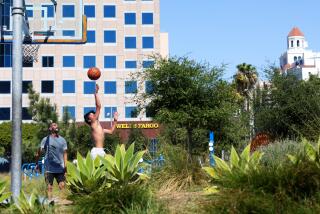Fate of College Newspaper in Air as Battles Lead to Editor’s Suspension
- Share via
Hot-tempered clashes between the managing editor of a college newspaper and her staff have led to the suspension of the editor and raised doubts about the future of the publication at California State University, Dominguez Hills.
Campus officials said they relieved Sheryl Martin of her duties at the Dominguez Weekly, a university-sponsored paper for journalism students, pending the outcome of an investigation into the squabbles.
Martin responded with a lawsuit alleging that her duties were “usurped” and that the student publication is illegally controlled by university officials.
Meanwhile, the staff, described as “demoralized” and “burned out” by Editor-in-Chief Julio Hernandez, has managed to continue publication of the tabloid weekly. Hernandez, who said he tried unsuccessfully to mediate “endless” disputes between Martin and other staff members, expressed determination to finish the semester with a final edition this week.
But most of the staff doesn’t plan to return in January, when the newspaper normally resumes publication after the semester break, Hernandez said, adding that he hasn’t made up his mind on whether to come back.
“If we decide not to come back, the paper will have to close up,” he said. “. . . It’s been a trying experience. I feel totally drained of energy.”
Nonetheless, faculty adviser Andy O. Alali Jr. and several of the student journalists said they were confident that the campus paper will be back next semester.
Features editor Wade Denkins, who defended Martin as a capable, hard-working editor, said that even if a majority of the current staff doesn’t return, “somebody new will take our places.”
Abby Schwartz, the paper’s business manager, said that since Martin’s departure, the staff has been working together smoothly. “There was no problem before Sheryl, and there is no problem after Sheryl,” she said.
Martin, reached at her home in Los Angeles, declined several requests for a telephone interview.
Hernandez said Martin’s “abrasive personality” and unwillingness to compromise on editing changes and assignments led to an open rebellion in which some editors and reporters refused to appear in the newsroom when she was around. He said he had to break up one particularly loud confrontation between Martin and news editor Carl Dunlap.
In a newsroom interview with eight of about 20 editorial and production members of the paper’s staff, most complained about what they termed Martin’s rude manners and lack of tact. One student writer said Martin referred to one of her stories as “garbage.”
Denkins, the features editor, said racial feelings may have entered the dispute, which culminated in a staff petition demanding Martin’s ouster. Denkins, who is black, said the predominantly Anglo and Latino staff may have resented taking orders from Martin, who is black.
He said Martin “was very easy to get along with if you just did the work she asked you to do. I respected her ability and knowledge.”
Martin is a communications major rather than journalism major, and some students questioned her qualifications for the managing editor job. She is one of several paid newspaper staff members and receives $48 for an eight-hour week.
Alali, the paper’s adviser and the students’ journalism teacher, declined to comment on the dispute with Martin, citing Martin’s legal action. But at the newsroom session Friday, he said he would not interfere with what he called the First Amendment rights of his students to air their views.
“A person needs a lot of patience to go through this kind of crisis without being badly affected,” said Hernandez, who is completing his third semester on the newspaper’s staff, the last as editor-in-chief.
The last major fracas at the student newspaper erupted in early 1985, when student government leaders attempted to seize control from the editors. At the time, the paper, called the Bull’s Eye, was operated and partly financed by student fees--a factor cited by the student leaders in claiming that they had the right to select the paper’s editors and control its editorial policies.
Financed by University
After the editor-in-chief and faculty adviser both resigned, the late President Richard Butwell resolved the dispute by incorporating the publication into the university’s regular instructional program. Since then, the paper has been operated by the Communications Department and largely financed from university funds.
Last year, the Dominguez Weekly briefly attracted notice when it endorsed Sen. Alan Cranston (D-Calif.) for reelection, in defiance of a Cal State policy against such endorsements.
Martin’s lawsuit, which she filed without an attorney in Los Angeles Superior Court, argues that control of the newspaper should be returned to Associated Students, the campus student government organization. No hearing has been scheduled on the suit.
Mayer Chapman, general counsel at the Cal State chancellor’s office in Long Beach, said a copy of Martin’s lawsuit is being reviewed. “If it has legal validity, we will ask the state attorney general for an opinion,” he said.
Another Paper Finds Respite
Meanwhile, another South Bay college newspaper has found respite from the often-stormy trials of student journalism. Harbor Tides at Los Angeles Harbor College in Wilmington resumed publication last month after a two-year hiatus brought on in part by community outrage over a series of rightist articles on the Holocaust.
The articles, which claimed, among other things, that the Holocaust never happened, were condemned by Jewish organizations as neo-Nazi propaganda. After the newspaper, then called the Hawk, was officially censured by trustees of the Los Angeles Community College District, campus officials let the publication die.
Robert O’Neill, a veteran journalism instructor, is the faculty adviser of the revived newspaper.
More to Read
Sign up for Essential California
The most important California stories and recommendations in your inbox every morning.
You may occasionally receive promotional content from the Los Angeles Times.










